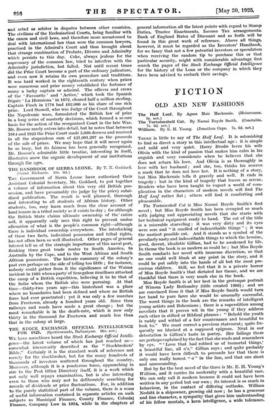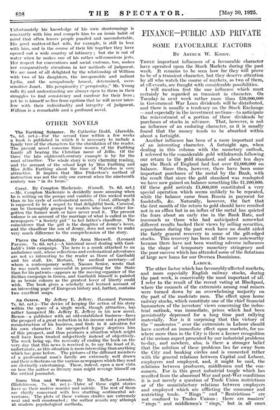FICTION
OLD AND NEW FASHIONS
The Half Loaf. By Agnes Muir Mackenzie. (Heinemann
6s. net.)
THERE is little to say of The Half Loaf. It is astonishing to find so direct a story in this intellectual age : it is simple and mild and very quiet. Harry Brodie loves his wife
Olivia with the kind of passion that makes him calm in his anguish and very considerate when he believes that she does not return his love. And Olivia is as thoroughly in love with her husband ; and she, too, thinks his reserve a mark that he does not love her. It is nothing of a story, but Miss Mackenzie tells it gravely and well. It ends in tragedy : but in the kind of tragedy that leaves us serene. Readers who have been taught to expect a world of com- plication in the characters of modern novels will find The Half Loaf rather flat ; others will find it comforting and pleasurable.
The Tortoiseshell Cat is Miss Naomi Royde Smith's first novel ; but Miss Royde Smith has been occupied so much with judging and appreciating novels that she starts with her technical equipment ready to hand. The cat of the title is a miserable starveling : it was very dirty and its eyes were sore and " it smelled of indescribable things " ; it was the nastiest possible cat. And it stands as a symbol of the peculiarly nasty and indescribable things to which the heroine, good, decent, idealistic Gillian, had to be awakened by life. In theme the book is as modern as could be ; but Miss Royde Smith conducts her novel with immense discretion, so that no one could well blush at any point in the story, and it could be put safely into the hands of all but the most pre- cocious children. Still, we feel that it is a private horror of Miss Royde Smith's that dictated her theme, and we are thankful that there is very much else in the book.
Miss Royde Smith is at her best in the grotesque portrait of Winona Lady Bottomley (title created 1906) ; and we are convinced from it that if Miss Royde Smith would turn her hand to pure farce she would be unusually successful. The worst things in the book are the remarks of intelligent young artists and Bohemians ; there is a superstition among novelists that it proves wit in the young if they address each other in stilted or Biblical phrases : " Behold the youth is ruddy and withal of a fair countenance and beautiful to look to." We must correct a previous statement; quite fre- quently we blushed at a supposed epigram. Next in our detestation is Gillian's taste in poetry. Her failings there are perhaps explained by the fact that she reads and remembers by eye. " ' Love that had robbed us of immortal things,' a beautiful line, all o's," Gillian says ; and quite probably it would have been difficult to persuade her that there is only one really honest " o " in the line, and that one short and unresounding.
But by far the best novel of the three is Mr. E. H. Young's William, and it carries its modernity with a beautiful ease. We can only call it modern because it could not have been written in any period but our own ; its interest is so much in behaviour, in the contact of differing outlooks. William Nesbitt is a shipowner, growing old now ; he has a generous and fine character, a sympathy that gives him understanding of his fellow mortals, a keen intelligence, a wide tolerance. Unfortunately his knowledge of his own shortcomings is constantly with him and compels him to an ironic habit of mind that often leaves people puzzled and uncomfortable. His good matter-of-fact wife, for example, is still in love with him, and in the course of their life together they have opened out a wide country of intimacy ; but she is out of water when he makes one of his rather self-conscious jests. Her respect for conventions and social customs, too, makes her comparatively circuitous in her methods of judgment. We are most of all delighted by the relationship of William with two of his daughters, the irresponsible and radiant Lydia, and the scrupulously honest, determined, over- sensitive Janet. His perspicacity (" perspicuity," Mr. Young calls it) and understanding are always open to them in their struggles to find consistency and candour for their lives ; yet he is himself so free from egotism that he will never inter- fere with their individuality and integrity of judgment. William is a remarkable and a profound novel.











































 Previous page
Previous page